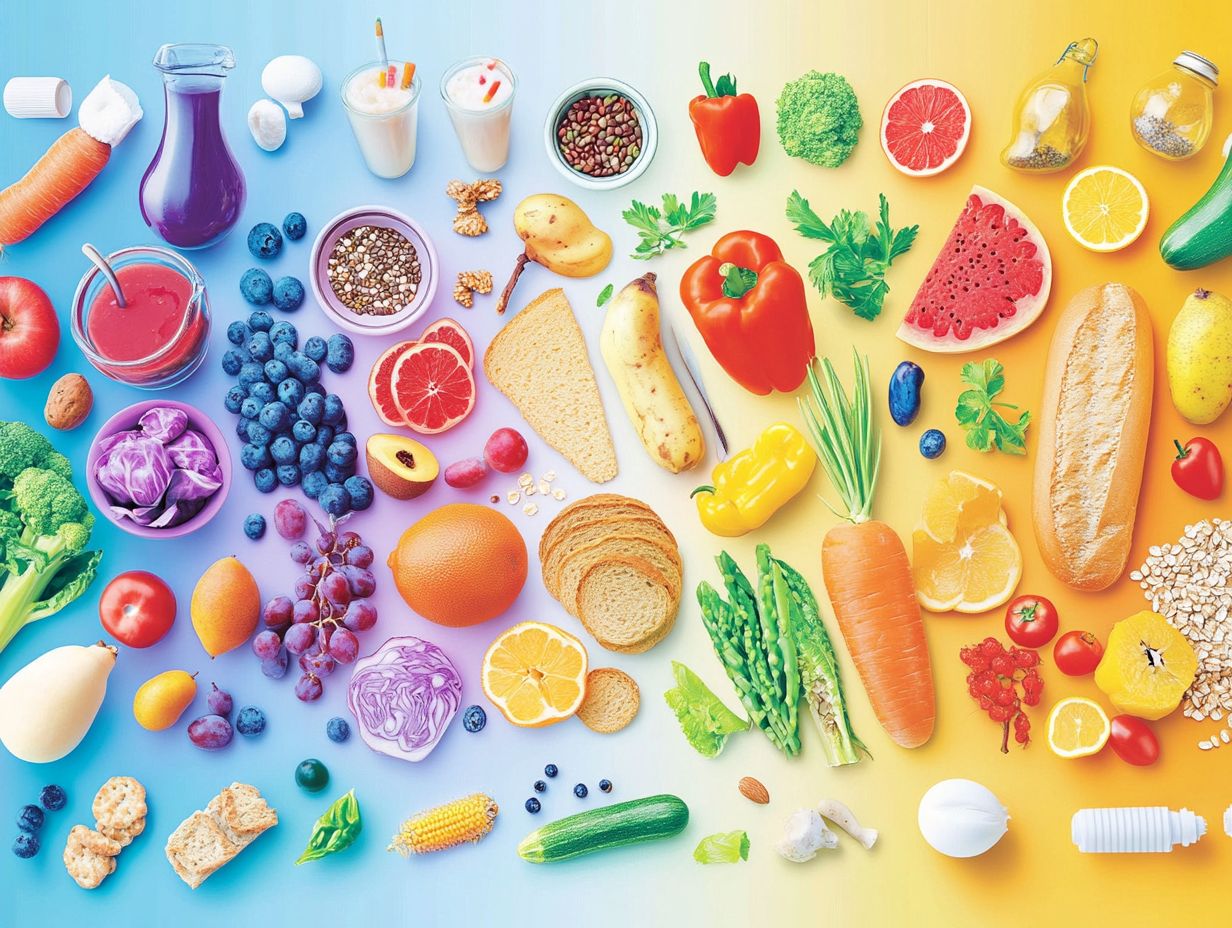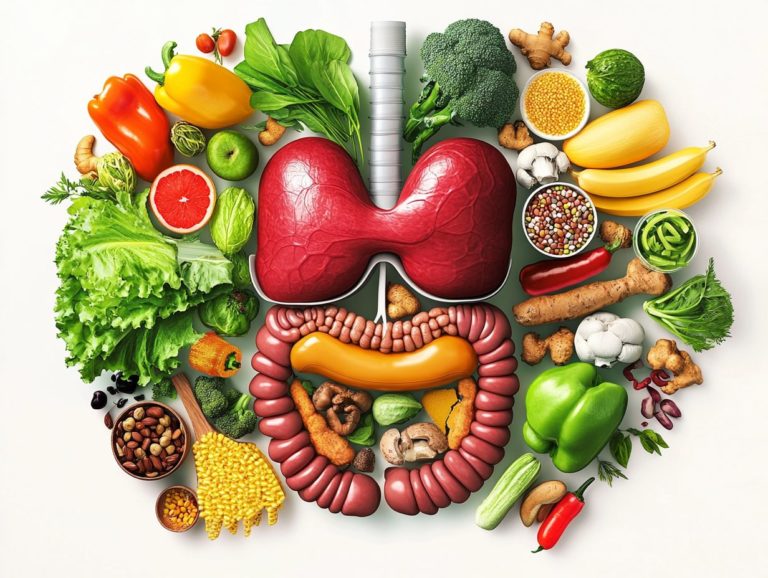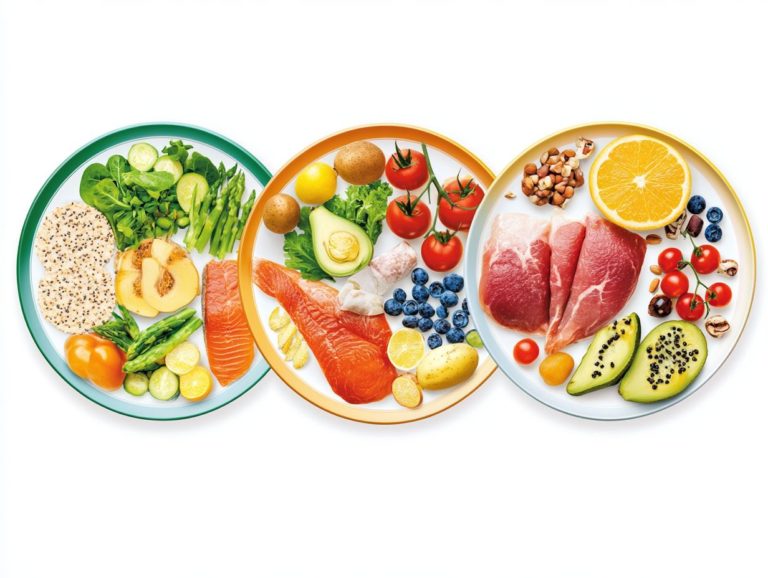Nutritional Needs for Different Life Stages
Understanding how nutritional needs evolve throughout life is crucial for maintaining health and well-being.
Infants and toddlers experience rapid growth. Specific dietary demands arise at each life stage.
This article delves into the essential nutrients and feeding guidelines tailored for various age groups, including children, adolescents, adults, and seniors.
By exploring these customized dietary recommendations, you can discover how to effectively nourish yourself or your loved ones at every stage of life.
Contents
- Key Takeaways:
- Nutritional Needs for Infants and Toddlers
- Nutritional Needs for Children and Adolescents
- Nutritional Needs for Adults
- Nutritional Needs for Older Adults
- Frequently Asked Questions
- What are the nutritional needs for infants?
- How do nutritional needs change in childhood?
- What are the key nutrients needed during adolescence?
- Are there specific nutritional needs for pregnant women?
- How do nutritional needs change in older adults?
- Can nutritional needs differ based on individual lifestyles?
Key Takeaways:

- Infants and toddlers require adequate intake of key nutrients such as iron, calcium, and vitamin D to support their rapid growth and development.
- Children and adolescents have specific daily intake recommendations for essential vitamins and minerals, along with guidelines for a balanced and varied diet to support their growth and overall health.
- As adults, it is important to prioritize a diet that includes a diverse range of nutrient-dense foods to meet daily nutritional needs, including vitamins, minerals, and important nutrients.
Why Nutritional Needs Differ Across Life Stages
Nutritional needs vary significantly across different life stages. It s essential to recognize the unique physiological and developmental requirements at each point.
In infancy, breast milk is the primary source of nutrition. As children enter their growth phases, a balanced intake from various food groups becomes vital to support those energetic growth spurts.
When you reach adulthood, the focus shifts to maintaining health through portion control and nutrient-dense foods. Meanwhile, as you age, your body’s metabolism changes, meaning it processes food differently.
During infancy, it’s crucial to ensure adequate calcium intake to develop strong bones. Toddlers benefit greatly from vitamin C to bolster their immune systems.
As children transition into adolescence, their increasing physical activity levels call for more iron and calcium to support muscle growth and bone density. For young adults, a diet rich in vitamins and minerals becomes essential for energy and overall wellness, especially with the metabolic shifts that accompany aging.
In older age, the spotlight often shifts to maintaining heart health and preventing osteoporosis. Regular nutrient evaluations become vital, along with physical activity tailored to individual capabilities.
Nutritional Needs for Infants and Toddlers
Infants and toddlers possess distinct nutritional needs, primarily driven by their rapid growth and development. In those initial months, breast milk serves as the cornerstone of their diet.
As they begin transitioning to solid foods, it’s vital to introduce a diverse array of nutrient-dense options. This not only meets their essential nutrient requirements but also lays the foundation for healthy eating habits from an early age.
While ensuring proper hydration and managing fussy eating tendencies can present challenges, incorporating nutritious snacks and a variety of food groups can significantly enhance the balance of their meal times.
Key Nutrients and Feeding Guidelines
Understanding the key nutrients essential for infants and toddlers is crucial, as these nutrients directly impact their health, growth, and development. Calcium and iron stand out as particularly vital during these formative years.
It’s important to prioritize a balanced intake of vitamins and minerals, ensure adequate hydration, and incorporate omega-3 fatty acids for optimal brain development. These feeding practices will lay the groundwork for lifelong healthy eating and nutritional habits.
In addition to calcium and iron, don’t overlook vitamin D, which plays a significant role in bone health and immune function, while zinc supports overall growth and development.
For infants, aim for around 200 mg of calcium and 11 mg of iron daily, gradually increasing these amounts as they transition to solid foods.
Encouraging healthy eating can be as simple as introducing a variety of colorful fruits and vegetables, making mealtime enjoyable, and modeling positive eating behaviors. Utilizing finger foods can also nurture self-feeding skills, promoting independence and a more diverse palate as they grow.
Nutritional Needs for Children and Adolescents

Children and adolescents undergo remarkable physical and cognitive development, making a diverse and balanced diet essential to meet their growing dietary needs during these pivotal growth spurts. Their nutritional requirements emphasize the importance of food variety, ensuring they receive all the essential nutrients necessary for healthy growth and development, including vitamins, minerals, and sufficient hydration.
Adopting healthy eating practices, such as appropriate portion control and structured meal times, is crucial in establishing lifelong nutrition habits that will serve them well into adulthood.
Recommended Daily Intake and Dietary Guidelines
- The recommended daily intake for children and adolescents varies based on age, activity level, and individual health needs.
- A strong emphasis on including foods rich in nutrients helps meet dietary guidelines.
- Ensuring adequate calcium intake is vital for bone health.
- Vitamin C plays a crucial role in supporting immune function and overall well-being.
Structured dietary guidelines help parents and educators make informed choices about meals and snacks, ensuring a balanced intake of all necessary nutrients.
Incorporating a variety of whole grains, fruits, and vegetables is essential for providing those vital vitamins and minerals. Simplifying meal planning can be as easy as encouraging a spectrum of colors on the plate, each representing different nutrients.
Imagine a vibrant stir-fry with spinach, bell peppers, and carrots delivering a wealth of vitamins! Complement these with snacks like yogurt and nuts that provide protein and healthy fats. Get your kids involved in cooking! It sparks their interest in healthy eating and helps them understand how their daily choices affect their growth and energy.
Nutritional Needs for Adults
As an adult, your nutritional needs evolve to prioritize health maintenance and weight management. It’s essential to adopt a balanced diet that encompasses a variety of food groups, ensuring you receive an adequate intake of essential nutrients.
Emphasizing healthy eating principles is crucial; this means paying attention to portion control and selecting foods rich in nutrients that deliver the necessary vitamins and minerals while keeping empty calories to a minimum.
Complementing these dietary choices with regular physical activity will significantly enhance your overall well-being.
Key Nutrients and Dietary Recommendations
- Key nutrients for you as an adult include calcium, iron, and omega-3 fatty acids.
- Calcium is crucial for strong bones.
- Iron is vital for oxygen transport in your blood.
- Omega-3 fatty acids are your allies in promoting heart health and supporting cognitive function.
It s important to embrace dietary recommendations that emphasize proper hydration and a diverse range of food choices. Grasping the effect of nutrition on body image can refine your dietary habits, encouraging a holistic approach to healthy eating that prioritizes both your physical health and mental well-being.
You should strive to incorporate vibrant fruits, leafy greens, lean proteins, and whole grains into your meals to ensure a well-rounded intake of these nutrients. Staying hydrated with sufficient water and limiting processed foods can further elevate your overall well-being.
By nurturing an understanding of how nutrition directly influences body image, you can cultivate positive self-perceptions, reinforcing the belief that nourishing your body is a profound act of self-care and respect.
Nutritional Needs for Older Adults

As you age, your nutritional needs change. These changes affect your metabolism, digestion, and overall health.
This makes it crucial to prioritize foods rich in nutrients in your diet. With aging often comes a reduced appetite and shifts in taste preferences.
These shifts prompt the need for thoughtful dietary adjustments. Consider enhancing flavors and ensuring you stay well-hydrated to support your well-being.
Certain nutrients, like vitamin D and calcium, become more important. They play a vital role in maintaining bone health and preventing deficiencies.
Age-Related Changes and Nutritional Considerations
Age brings about significant changes that can profoundly affect nutritional needs. Tailored dietary guidelines for older adults are essential.
These guidelines address specific challenges, such as reduced nutrient absorption and shifts in taste and appetite.
Incorporating omega-3 fatty acids into your diet can combat inflammation and support cardiovascular health. Don’t underestimate the importance of proper hydration it’s crucial for overall wellness and cognitive function.
A thoughtful approach to meal planning can enhance your quality of life. As metabolism tends to slow down with age, you may need to adjust your caloric intake while ensuring nutrient density remains high.
Dental issues can also impede chewing, making softer foods rich in vitamins and minerals essential. Including fiber-rich foods will aid digestive health.
Vitamins D and B12 are vital for maintaining bone integrity and energy levels, respectively. Encouraging a colorful variety of fruits and vegetables in your meals provides a broad spectrum of nutrients.
Creating a supportive mealtime atmosphere can significantly boost appetite and foster social interaction, enhancing both physical and emotional well-being.
Frequently Asked Questions
What are the nutritional needs for infants?
Infants require a high intake of protein, fat, and carbohydrates to support their rapid growth and development. Breast milk or formula should be the main source of nutrition for the first six months, followed by the introduction of solid foods.
How do nutritional needs change in childhood?

As children grow, their nutritional needs change to support their physical and cognitive development. They require more nutrients, particularly calcium, iron, and vitamin D, for bone growth and overall health.
What are the key nutrients needed during adolescence?
During adolescence, the body undergoes significant physical changes and requires increased amounts of nutrients. Adequate intake of calcium, iron, and vitamin D is crucial for bone development, while carbohydrates and protein support energy and muscle growth.
Are there specific nutritional needs for pregnant women?
Pregnant women have increased requirements for certain nutrients, such as iron, folic acid, and calcium. These nutrients support the growth and development of the fetus. It is also important for pregnant women to maintain a balanced and varied diet to ensure proper nutrition.
How do nutritional needs change in older adults?
As we age, our metabolism slows down and our nutritional needs change. Older adults may require more protein, fiber, and calcium to maintain muscle mass, digestive health, and bone strength.
Can nutritional needs differ based on individual lifestyles?
Yes, nutritional needs can vary based on an individual’s lifestyle. For example, athletes may require more protein and carbohydrates to support their physical activity. Meanwhile, vegetarians may need to pay special attention to their intake of iron, B vitamins, and protein from non-animal sources.





